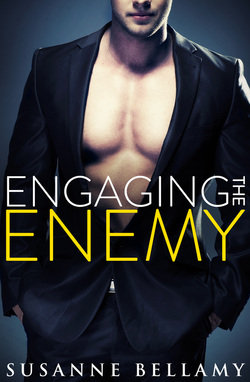| Challenge and excitement seem to sum up the process of not only writing a serialised story, but doing it collaboratively. Two people who relish the process are Tamara Thorne and Alistair Cross. Thanks for joining me! 1. What is the attraction of serialised stories for you, and for your readers? Our attraction to serialization is that it’s very immediate, seat-of-your-pants writing. This makes it very exciting and spontaneous for us and it’s wonderful knowing that readers don’t have to wait a year for something new. What we are working on today will be in readers’ hands a month from now. 2. Why did you decide to co-author Belinda? Because Belinda is a wild girl with a very busy and extraordinary life, there’s really no way only one person could accurately chronicle her adventures. Also, because of the subjects we are exploring, we felt that the influence of both male and female perspectives would give the story the kind of reality and presence it deserves. 3. What factors need to be taken into account when considering a collaboration? The first consideration must be your ultimate visions. You can’t write with someone who doesn’t want the same outcome as you. Having good senses of humor is vital, too. Most importantly, there must be a firm respect between collaborators - not only in terms of writing and business but regarding personal lives. Drama belongs on the page and that’s where it goes. 4. How do you manage the practical aspects of collaboration such as planning, different writing times, editing etc? We meet every morning, Monday through Saturday, on Skype and in the Cloud, and spend anywhere from 8 to 10 hours working. We spend the first hour or two brainstorming and discussing, and taking care of writing business. Then we move into the actual writing which takes up the rest of the day. You might say we save the fun part for last. 5. You can’t go back and feed in a clue or details once each part of the story is published. How do you manage a problem of omission? We have to be meticulous about our outline, making sure we are in full agreement on where we want the story to go. It is a lot different - and in many ways, more difficult - than writing a full novel because of that. We must also have firmer grasps of minute details than we ordinarily would if writing solo in order to avoid mistakes and omissions. For example, we must know what our characters are wearing, how they comb their hair and what perfume or cologne they are partial to in case we both happen to mention it. We must both know furniture and architectural details in advance, too. When writing our regular novels we are exacting in our character and location profiles, but we can go back and make corrections if necessary. Not so on a serial novel. That’s why our method of writing - literally together in the Cloud - works so well for this. 6. Please explain the level of planning required when creating a serialised story. With a traditional novel, a writer is allowed more freedom - the story can shift direction a little more because you’re able to go back and add changes before it reaches readers. With a serial, you’re committed to what has already been published; there’s no going back. Because of this, the required planning needs to be quite a bit more thorough. We aren’t able to deviate from our outline as much. 7. Do you have any advice for writers considering a collaboration/serialisation? Again, if you’re going to write with someone, keep the drama on the page where it belongs. When you collaborate, you are going into business with another person. You must make your goals - and your boundaries - very clear from the beginning. You’re going to be spending a lot of time with the person you’re writing with, so you have to be compatible, respectful, and professional. As for advice on writing a serialized novel, we would say, clear your schedule. It’s time consuming - but well worth it. We both feel fortunate in having found each other. We are each the other’s perfect collaborator and we’re having a blast with our serial novel as well as the thriller/horror novel we are simultaneously writing. We plan on doing many more of both. What do you enjoy most about serials? Leave a comment or just say hi! If you enjoyed reading this post, please share on your preferred social media platforms. Thanks! |
|
5 Comments
 The Attraction of Exotic Settings #1 in a series on the call of other places Buon giorno! Namaste! G’day! Exotic places grab my imagination and fire multiple story ideas. My husband and I, and sometimes our children, have travelled quite a lot, through Asia, Europe, Britain and west coast America. Culture, attitudes, languages differ and therefore understandings or interpretations of even basic things can be challenging. My first attempt to order a latte in Tuscany highlighted this for me. A latte in Italy is hot milk, not the milk coffee we associate with the name here. Fortunately, an Austrian customer who spoke Italian and English cottoned on to my surprise and the situation was easily remedied. And I quickly settled on cappuccino as my preferred form of coffee. Language incorporates different cultural understandings and these aren’t limited to languages other than English. Differences between various forms of English can be humorous as well. A simple example from my next release is that Matt, the Irish hero of Engaging the Enemy, cannot use the word ‘kid’ when referring to a child because he thinks of a baby goat. He uses ‘bairn’ which confuses Andie. Even simple colloquial names for a child differ and it’s important to accurately reflect culture as well as character in your writing. Then there are basic, everyday actions such as driving. Stick to the left, overtake on the right. Easy. Unless you’re in Hawaii, or Europe. The first heroine I created landed on Kauai, jet-lagged and annoyed by being given a different vehicle to the one she’d ordered. On turning out of the airport, she was confronted by a truck bearing down on her before she remembered and dodged into the ‘wrong’ lane and breathed a sigh of relief. So many of our daily actions are automatic and instinctive after a lifetime of repetition. Even crossing the road in a country where vehicles drive on the right hand side offers potential for conflict. For a writer, these offer a treasure trove of potential, from first meetings to conflict situations. I took this idea and placed it on the Amalfi Coast road for my novella, One Night in Sorrento. Luca almost literally runs into Rhiannon because she forgets the traffic drives differently there. (She also learns what it’s like to ride behind a hot Italian biker, but that’s not part of this discussion ;) ) Our first encounter with a zebra crossing in Hanoi was beyond scary. Expecting traffic to stop as we stepped off the kerb, we were taken aback that the lanes ahead continued as if we weren’t there. What we had to learn—and quickly—was that you cross slowly in what amounts to a dance between you and the road traffic. They glide forward until you are in their lane then slip past as soon as you’re out of their direct line. Slow and steady is the goal but it took nerves of steel to become acclimatised. Next week, join me as I delve deeper into writing exotic settings. Please leave a comment and tell me what would you like to see discussed here. Or share an exotic experience! If you enjoyed this post, I'd appreciate you sharing on FB, Twitter etc. I’d love to hear from you! Till next week, Ciao!  As Shakespeare wrote: What’s in a name? For Juliet, Romeo Montague symbolised her enemy and a forbidden, undesirable relationship but mention Romeo and Juliet and modern readers understand you refer to one of the best-known love stories of all time. Titles have to earn their keep. They not only catch the browser’s attention but also set up reader expectations about content. Effective titles should also provide a good idea of the type of writing. Given that the title is often the first contact potential readers have with your work, it is important to get it right. When my son was born, we felt the weight of naming him and the need to get it just right. Nurses kept asking us if we had named ‘the baby’ yet and we shook our heads. After three days and several attempts, we were finally able to answer Yes. His name felt right. Authors are like parents with a newborn, crooning over their creation and in love with their ‘baby’. And like parents, we have the difficult task of naming our book baby. Titles are generally chosen by publishers, which can be a good thing. Consider how different our perceptions of To Kill a Mockingbird could be if Harper Lee had published it under the earlier working title of Atticus or F. Scott Fitzgerald’s The Great Gatsby had emerged as Trimalchio in West Egg. While the first might have worked I suspect the only egg might have been on FSF’s face! As authors, we are so involved in creating our stories that it can be almost impossible to step back, assess our writing and encapsulate it within a brief phrase. Publishers have marketing staff who understand what resonates with readers and the ability to consider our book baby objectively. Suggestions for titling a work include listing key themes and characters and playing around with combinations of these. This site offers twenty tips for creating a title: http://writing.umn.edu/sws/assets/pdf/quicktips/titles.pdf My next release began life as a work-in-progress called "Merger in Melbourne". I liked the alliterative effect but was told to aim for a more 'high concept' title so renamed it "Besting the CEO". This made use of the gerund (-ing form of the verb) and the hero’s occupation. Then my publisher, Escape Publishing, came up with "Betting on the Boss". (same pattern but with alliteration added!) My editor suggested a change after first round edits and finally we have ENGAGING THE ENEMY! It's clever on so many levels, not least of which is that it picks up on modern Romeo and Juliet elements! And that’s how my next release gained its moniker. Hope you enjoy it. Engaging the Enemy – available 1 August 2014. |
AuthorStory elements surround us every day, from new places to a favourite piece of music or an odd moment witnessed in passing that becomes a scene in our work. On this weekly post, fellow authors will share some of what inspires their stories and their lives. Sit back and make yourself comfortable with the drink of your choice as the curtain rises. Archives
June 2020
Categories
All
|





 RSS Feed
RSS Feed
